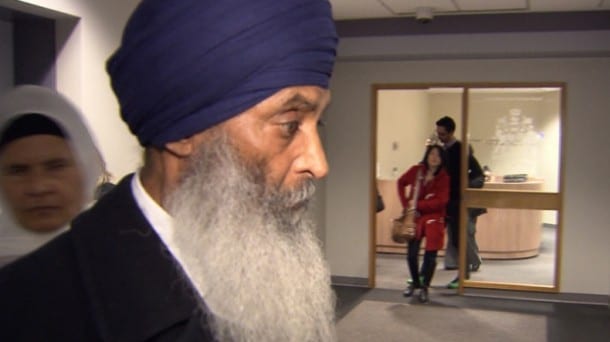
Bhai Gurmej Singh attended an immigration hearing in Vancouver
VANCOUVER, BC, Canada (February 27, 2014)—A man who says he once led the British chapter of a group that has been banned in Canada – and [is] the prime minister in exile of the aspirational Sikh homeland of Khalistan – has told an immigration hearing his faction never advocated violence.
An admissibility hearing was held Wednesday in Vancouver for Gurmej Singh Gill. Mr. Gill, 71, had permanent residency in Canada in the early 1980s and returned to this country for a visit in November. The Canada Border Services Agency referred his file to the Immigration and Refugee Board and said Mr. Gill should be deemed inadmissible for being a member of Babbar Khalsa.
Mr. Gill, speaking through an interpreter, repeatedly told the hearing he is a peaceful man. He said the British Babbar Khalsa, which he led from 1984 to 1992, did not engage in violence and was entirely different from Babbar Khalsa groups in other countries, such as Canada.
But he was hard-pressed to explain why he wrote an earlier declaration for the CBSA that identified him as the leader of “Babbar Khalsa International.”
Mr. Gill said he had written, in Punjabi, that he was the leader of the group’s British chapter. The interpreter at Wednesday’s hearing, though, said Mr. Gill had clearly written he was the head of Babbar Khalsa International. Mr. Gill denied he was ever a member or the leader of an international group. The CBSA hearings officer told the board Babbar Khalsa is one group and the various names are interchangeable.
When asked how he became leader, Mr. Gill said the British Babbar Khalsa was founded after the June, 1984, attack on the Golden Temple in India. He said a few like-minded Sikhs got together to demand justice. He said he was one of five leaders in all.
“Whatever injustice had been done to the Sikh community, whatever happened at the Golden Temple, all that was to be highlighted, brought to the forefront, through media, through [politicians],” Mr. Gill said through the interpreter.
He added that the group’s mandate made clear it was not to break the law, and that he was only aware of the existence of Babbar Khalsa groups in other countries through the media.
Mr. Gill was asked by the CBSA hearings officer about a 1990 newspaper report in which he was quoted as saying Sikhs would use force in India to support their cause. He said he never made a statement that would fall outside the law. “Peace and justice. This is in my blood and this is everything,” he said.
Mr. Gill said he left the British Babbar Khalsa so he could have a “cleaner image” and focus on his role as prime minister in exile of Khalistan, a position he said he continues to hold today. He did not explain how he was named to such a position. Mr. Gill said the British Babbar Khalsa no longer exists and is finished forever.
Several of Mr. Gill’s family members were on hand for Wednesday’s hearing, including his 75-year-old wife. He has seven children, two of whom live in B.C.
Mr. Gill’s son, Navdej Singh Gill, testified that his father was only ever involved in peaceful protests, lobbying and meeting with politicians.
Avtar Singh Dhillon, whose sister is married to Mr. Gill’s son, testified that the name Babbar Khalsa is used loosely by many different organizations.
Geoff Rempel, the adjudicator hearing the case, reserved his decision and did not indicate when its ruling would be issued. If Mr. Gill is deemed inadmissible to Canada, he could still seek a Federal Court review.
ORIGINALLY PUBLISHED BY THEGLOBEANDMAIL.COM, COMMENTARY BY SIKH24.COM EDITORS.

